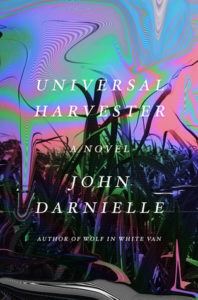25 Points: Universal Harvester
 Universal Harvester
Universal Harvester
by John Darnielle
Farrar, Straus and Giroux, 2014
224 pages / $13.21 buy from Amazon
1. I have not yet read Wolf in White Van, (but I hear good things). I also have not read (Black Sabbath’s) Master of Reality, (but I also hear good things).
2. Universal Harvester. The cover is pretty dope-looking. (Plus, it’s sorta cool that advance reader copies came in a VHS case). It totally vibes with my anodized rainbow finish razor. (That’s 2 for 2 Darnielle, tho, I am not actually counting Master of Reality).
3. But hear me out. I want to get this out of the way, like, right away: the book is marketed as horror and perhaps maybe even a little bit mystery. It’s none of these things, really. Or rather, the story isn’t horror in the way you’d expect it to be horror. And it’s also not mystery, in the classic sense of the word, mystery. It’s a little bit of both, and then some.
4. I’m not taking points away from the book either, because of this, no. It’s not Mr. Darnielle’s fault. Rather, he did this on purpose, and I applaud him (in a way) because of these things—Darnielle is trying to do something new & interesting here and, as you might expect, the average reader is not going to be so into that (I’m guessing). (Maybe the not-so-average reader, as well). The narrative is sort of non-linear (so be prepared for that).
5. I must confess, tho, to what intrigued me initially—what made me want to read the book as soon as possible—the story takes place in Iowa (I got my BA from a school in Iowa, this is no secret; and actually, the town where I went to school is mentioned, pretty early on). Also, the fact that it has something to do with VHS culture and film. (I have never seen The Poughkeepsie Tapes but the idea of VHS tapes and weird things happening on VHS tapes made me think of this film, for whatever reason).
6. I also tend to enjoy most things taking place during a time when the VHS market is / was still booming. READ MORE >
March 8th, 2017 / 6:05 pm
25 Points: Wolf in White Van
 |
Wolf in White Van
by John Darnielle
Farrar, Straus and Giroux, 2014
224 pages / $24.00 buy from Amazon
|
1. I don’t like writing. The actual act of writing, I mean. It’s hard to get started. Just getting this first of twenty-five points written took longer than the next twenty-four.
2. I like better having written, when there’s a mess of text on the page to play with. It’s not really creating anymore at that point; it’s discovery, exploring. Moving around in it and finding what I might have missed the first time.
3. John Darnielle’s Wolf in White Van is a book about a lot of things. Mostly, though, it’s about exactly this kind of discovery and exploring that appeals to me. Discovery through text, exploring between your ears. Imagined mountains, dreamt-up spaces.
4. “It gets so lonely living inside your own head,” writes the narrator, as way of explanation for having dreamt up one particularly dangerous space. The book centers on this hero’s reasons for—and the consequences of—dreaming up a game called Trace Italian.
5. Trace Italian is a by-mail role-playing game of sorts. “The way you play Trace Italian,” the narrator tells us, “seems unbearably quaint from a modern perspective, and people usually don’t believe me when I tell them it’s how I supplement my monthly insurance checks, but people underestimate just how starved everybody is for some magic pathway back into childhood.”
6. “A magic pathway back into childhood” is a better way of describing what this book is about. Memory, remembering. Finding the path back to a place where anything is possible.
7. It’s just the kind of book I like best.
8. I’m so glad this book isn’t called Trace Italian.
9. The “monthly insurance” checks the narrator mentions in point 5 above are part of the mystery of the book. What exactly happened that led this person to create a game and collect insurance checks? What caused him to live sequestered from the world? Why does he order swords from a catalog? Real, honest-to-god swords?
10. Players begin Trace Italian by sending an SASE to a PO Box and receiving in turn a sheet of paper telling them where they are in the imagined world. It’s a post-event world of sorts; they must traverse a landscape toward an end goal, the Trace, where they’ll find safety from the bad things that have taken over.
September 30th, 2014 / 2:50 pm
Scramble Up The Steep Side of a Cliff with Mark Doten’s Mountain Goats Day @ Dennis Cooper’s The Weaklings
 Greetings from Hong Kong! It is early in the morning here and a five-year-old is trying to get me to help her watch some kind of Barbie-as-the-little-mermaid DVD, but instead I am doing this. Mark Doten, good friend of HTMLGiant’s (and of mine), has put together a Day dedicated to The Mountain Goats for The Weaklings. It is filled with riches, not the least of which is a new interview with John Darnielle. Here’s a choice gleaning:
Greetings from Hong Kong! It is early in the morning here and a five-year-old is trying to get me to help her watch some kind of Barbie-as-the-little-mermaid DVD, but instead I am doing this. Mark Doten, good friend of HTMLGiant’s (and of mine), has put together a Day dedicated to The Mountain Goats for The Weaklings. It is filled with riches, not the least of which is a new interview with John Darnielle. Here’s a choice gleaning:
MD: People often speak of certain common technical mistakes in the work of young fiction writers — POV that doesn’t gel, overuse of adverbs in dialog tags, that sort of thing. Are there specific technical problems you see repeatedly in the work of beginning songwriters?
JD: Yeah there’s one, a pet one, which I’ll get to shortly, but the main thing is less technical than – well, for lack of a better term, “moral.” Not moral problems in the sense so much of “what you are doing is morally indefensible,” but more of a “the terms of the moral universe in which you are setting your song are lame, and since you’re the one setting those terms, this is a problem you should fix.” What the hell am I even talking about — this: young men (this problem really doesn’t seem to exist for young women who write songs) often like to present a narrator whose self-destructive “urges” (they usually aren’t real “urges” so much as cosmetic choices about how to present himself) are clearly placing him on a collision course with doom. The narrator of these songs often seems to hope that the important people in his life will be both very impressed by the special nature of his pain, and that some people who have spurned him will be so horrified by the things his pain has made him do that they will either a) give him what he wants from them or b) speak with awe about him.
Really can’t stand that kinda stuff. There is one thing special about your pain: it’s yours. That ought to be enough, in my opinion; you can describe it from there, and take control of it, detail it lovingly, etc. But when a narrator seems to think that he is somehow beatified by his own particular collection of neuroses, well, this bugs me. I was as guilty of this early on as anybody, and one of my most popular songs is pretty much One Of These Types, and it’s not that all songs like this are bad. In fact many of them are quite good. But it’s a tendency that should be outgrown quickly. Often there are two main characters in a song like this, and almost always, the song would be a much better one of the two weren’t acting like a child.
+
You should definitely go over there and check out Mark’s Goats Day. Also, you might want to refresh yourself on this Goats essay by Alec Niedenthal, published here last November.
Merry Christmas, from John Darnielle from John Prine from Michael Schaub from All of Us to You
via Michael Schaub’s facebook. There are drunk people screaming at each other in the street. Everything in New York is closed except every single bodega everywhere. I’m going to Florida tomorrow. Be bugging you from there, probably–God rest ye merry gentlemen till then. Ladies, too.
